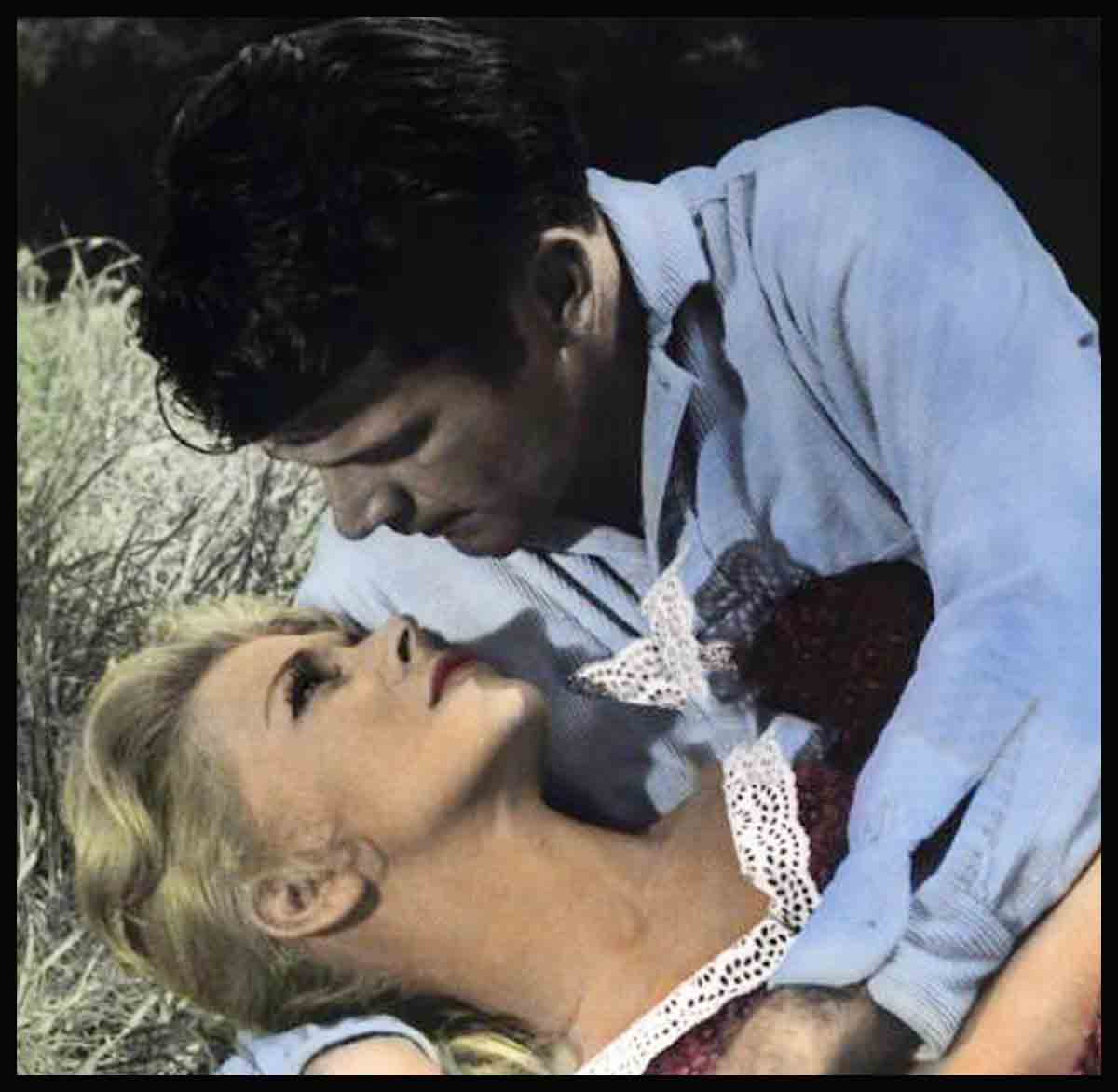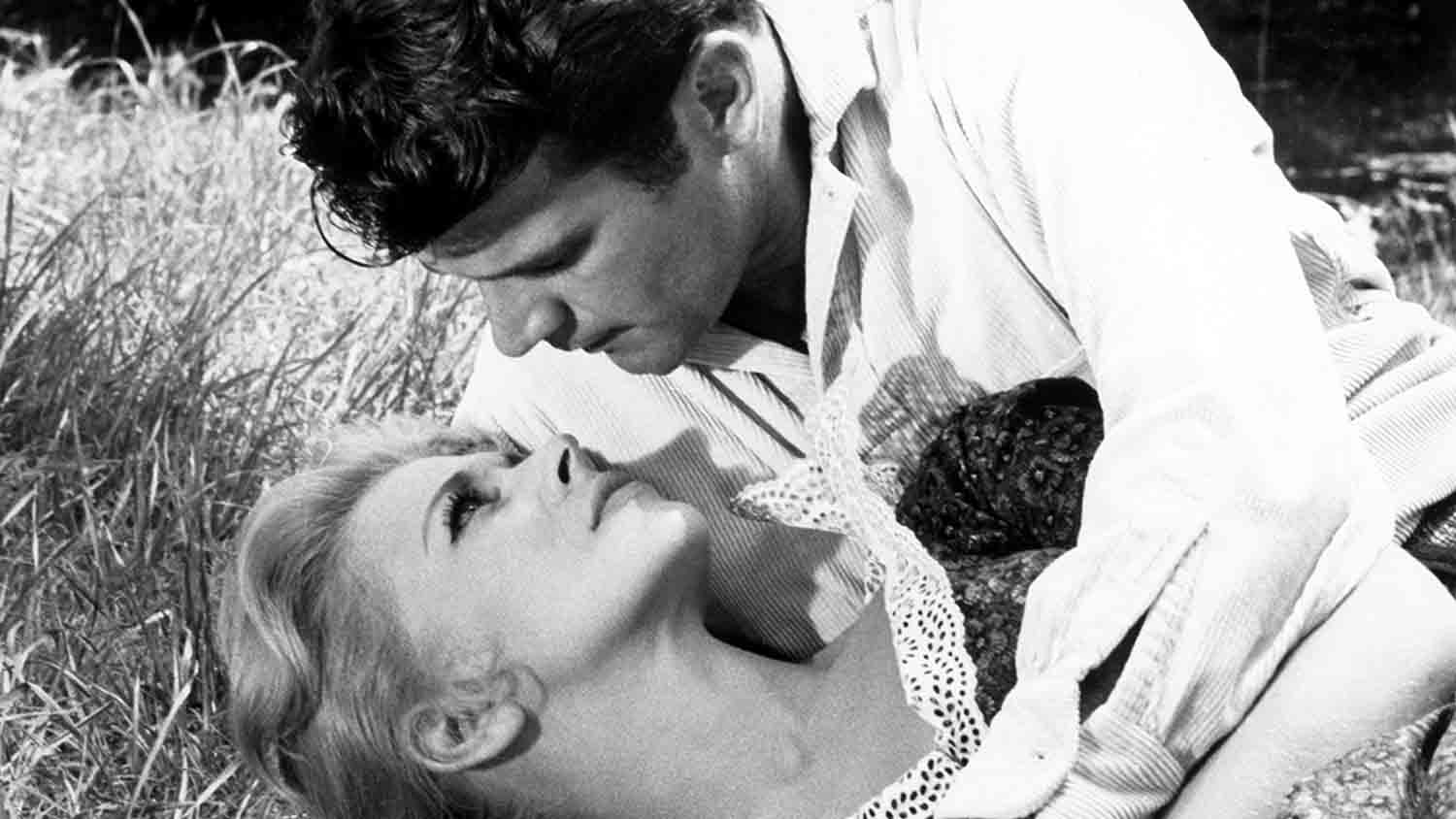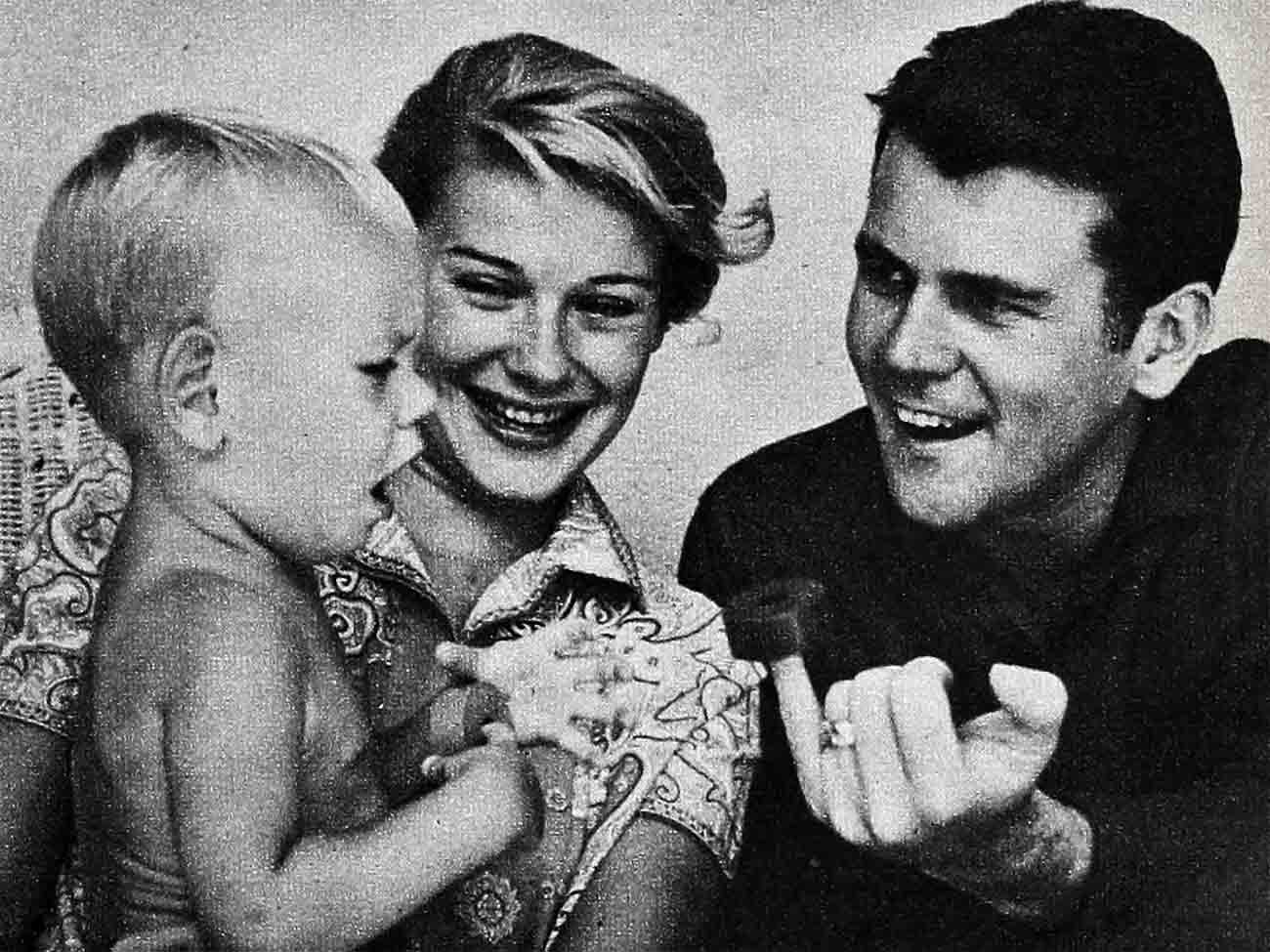
“Never Fall In Love With A Married Man”—Dolores Michaels & Don Murray
When Dolores Michaels came to Hollywood, she was acclaimed a new star. Her career looked very promising, and the future seemed bright. She was rather shy and didn’t enter into the gay round of parties and night life like most of the other young stars in town. . . . Then about a year after she arrived in Hollywood, she met Maurice Martine, a talented interior decorator and furniture designer. She met him during a trip to New York, but they settled in California. They built a beautiful and very expensive home in Laguna Beach. For six years she and her husband seemed very happy doing things together they both loved. They read a lot, went game hunting and skin diving and led a solitary life. But then, quite suddenly, Dolores told a newspaper interviewer that she was longing for excitement and glamour. She complained that she had become “dull.” And less than two months later, she sued Martine for divorce. . . . She was still young, very beautiful and vibrant. And she made up her mind to find the excitement that she had been missing. . . . Don Murray was quiet, too, but underneath his quiet ways was strength and determination. He had studied to become a Trappist monk before he had set his goal on becoming an actor. But once he made up his mind to act, he did, and his career, too, showed great promise. He married Hope Lange who gave him two children, and who shared his interest in helping refugee-resettlement projects in Europe. Hope and Don were an unusual Hollywood couple, but they seemed to belong together. Most people were shocked when rumors of a rift in their marriage began to circulate around town.
Hope was then co-starring with Stephen Boyd in “The Best of Everything,” and lunching with him almost daily. To quiet the gossip, Don often visited at their studio and joined them for lunch.
But it wasn’t long after, that Hope and Don decided they could no longer live together (the Boyd episode was not the contributing factor), and Don moved in with his good friend, Walter Wood.
And it was just at this point that Dolores and Don met. They had seen each other at the studio commissary, but they’d never spoken. Now they were to co-star in a movie, “One Foot in Hell.” “A prophetic title,” Dolores says today. But at the time, she had no idea of what was ahead.
Something happened between these two different people from the very first instant. “I found I was reacting to Don as a man rather than an actor,” says Dolores, “and was embarrassed and self-conscious about it. That wasn’t like me, and I wondered what was wrong with me.”
There was the incident of the horse. Dolores had never ridden before so Don swept her up in the saddle with him. “So you can get used to what it feels like to be on horseback,” he said. She found the horn of the saddle was pressing painfully against her, but, for some reason, she made no protest. Instead, she said, “Oh, I’m very comfortable.” She found herself forgetting everything but Don’s strong arms around her. And Don, too, seemed under some strange spell. He knew how to ride, and yet he didn’t realize that anything was wrong until the assistant director finally yelled, “The saddle’s coming off, get down.” Don and Dolores didn’t say anything. They just looked at each other.
Time passed. Then, suddenly, everything was out in the open.
“I’ve separated from Hope.” Don told her one evening after work. They were driving together along the Malibu coast. Dolores made no comment but she knew then that she loved him. And as two people often do, they became closer through their days of working together.
“Don is a man of softness that is not to be confused with weakness,” she says. “I discovered his strength as our relationship grew, and I came to respect it.” They began to have dinner together, go to the beach together and take long drives along the countryside. But all was not well.

“I created all the problems.” Dolores says. “I never once asked about Hope, but my underlying anxiety began to creep through. I was beset with doubts. And there was the pressure from the outside. My mother, a good Catholic, was anxious for me. Sometimes I could feel her doubts about me. Had I broken up this man’s home? Of course, I hadn’t, but the small guilts began to build—to be a weight.”
Her own divorce from Maurice Martine had just become final, and Dolores had the feeling her very religious family from the Midwest were more than disapproving. Tension mounted. And Don, though separated, was still a married man.
“And so,” says Dolores in all honesty, “I began to press, to push, to doubt, to plague. And all this time Don never once discussed his personal problems.” Perhaps if he had been able to talk over his plans for the future with Dolores, she may have been less anxious, less insecure.
But, of course, Don was a married man. and he never once discussed the possibility of marriage with Dolores. “Don.” says Dolores, “is a man of strength and honor.” But she, unfortunately, was a woman in love who needed him.
“I became depressed when I was not with him. Even one day away from him became a blue day. And looming in the distance was his long location jaunt to St. Louis for the movie ‘The Hoodlum Priest.’ ” The approaching date threw a cloud over everything. Not for Don, perhaps. but for Dolores. She had no ties with Don, no promises, no talks of a future together. And she panicked.
“Do you love me?”
One evening he came to have dinner with her. “I have to make this a short evening.” he said. “I have to be up early for details on the ‘Hoodlum’ story.”
Trying to hold on just a few hours longer, with the coming weeks of separation between them, Dolores began to push.
“Do you love me?” It was almost a demand. “Do you love me? Don’t lie to me.”
Don tried to calm her. but there was nothing he could say. After all, he was still married to Hope. How could he promise anything to Dolores?
But Dolores persisted. “If you love me, why aren’t I going to St. Louis with you? Why are you leaving me?”
Then, when she could see that she wasn’t going to sway him that way, she tried another method. She tried to punish him.
“Well, as long as you’re going to be busy, let’s just skip dinner tomorrow night,” she said coldly.
“The following night?” Don asked.
“No, no, I don’t want to see you at all.”
“Well. I’ll try to see you before I leave,” Don said quietly. But he walked out.
She had him on the phone an hour later. “I see I’m dealing with a man and not a boy,” she said.
“Look.” Don told her, “you have an image of what you think love is, and you’re trying to fit me into that. Well, I won’t fit into any preconceived notions you have. I’m me.” This man of great strength spoke quietly, without raising his voice. And Dolores knew what he meant.

But as the time for his departure grew closer, she panicked all over again. She had tried to change, to be stronger and less demanding. But it was no use, and, because of her panic, she weakened. She couldn’t stop herself from saying, “Now that I’ve changed, do you love me again? Now that I’m different, do you love me?” She was foolish, but she was a woman in love. and she wanted Don to need her as much as she needed him.
His only reply was, “I am not conforming to what you think I ought to be.”
He had said this before. And now there was nothing more that he could say. He left, and he refused her permission to visit him on location.
Dolores was in despair.
“Separation is death to two people who love each other.” she says now. “It contributed to the end of my first marriage, and I dreaded it. War and death should be the only separators. Otherwise, the thread is snapped and the tie broken.”
There were a few phone calls from St. Louis, not many, and a few letters. Again, not too many.
She lost weight. After a while, she tried dating, but it was no use. She still loved Don. And, in loving Don, a married man, she had no secure ground to stand on. She knew in her heart it was killing their relationship.
“I finally came down to the level of an apology.” she admits. “I had destroyed a lovely appreciation in Don Murray, and I knew it. He could say if he chose, ‘I called you a lovely woman. You’re not. You’re less than a girl.’
“He would have been right. I hadn’t reacted to the situation as a woman. I had been even less than a girl in my reactions.”
He’ll never forget her
“I created all the problems. I did it all. I fell in love with a married man.
“A man with children is never really divorced anyhow. A part of him is always married to the mother of his children. And Don is devoted to his children.
“Don could never have been totally mine under those circumstances. He had a son and a daughter. And his heart would always have been with them, of course.”
Don and Dolores see each other occasionally now, but as friends. The frenzy seems to have died down. Dolores went about the preparations of her new film, “Battle at Bloody Beach,” with resigned calm, and left for the six weeks location on Catalina Island. Another separation. But men don’t forget Dolores easily. “My beaus even from way back in grade school always come back into my life, as friends,” she says. So who knows—maybe Don Murray will one day come back into her life, too.
And if not, perhaps Dolores will have learned something from her relationship with Don. She was young and foolish, and she was looking for romance. She made the mistakes of a woman in love. But she’s the first to admit that her biggest mistake was falling in love with a married man.
THE END
—BY JULIA CORBIN
Don and Dolores are in 20th’s “One Foot in Hell.” Don is also in “The Hoodlum Priest” for United Artists, and Dolores is in 20th’s “Battle at Bloody Beach.”
It is a quote. PHOTOPLAY MAGAZINE MAY 1961




